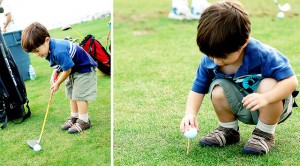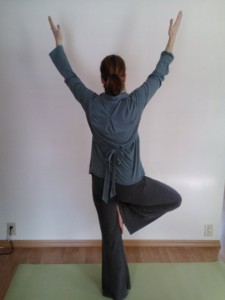 I had a familiar conversation recently, this time on the golf course. As with life, golf is both precise and random: precise because there are exactly 18 holes to play, and random because a golfer never quite knows how the ball will fly from time to time nor with whom the starter will pair you up to play. We were paired with two great golfers who both happened to be named Sean.
I had a familiar conversation recently, this time on the golf course. As with life, golf is both precise and random: precise because there are exactly 18 holes to play, and random because a golfer never quite knows how the ball will fly from time to time nor with whom the starter will pair you up to play. We were paired with two great golfers who both happened to be named Sean.
Sean #1 asked what I did for a living. I gave him my elevator speech about being a Neutral Child Specialist in Collaborative Team Practice and he said, “Wow, that sounds awesome…..it must be really hard work.” My response is always that sometimes it’s hard work, but mostly it’s very rewarding to help families make the difficult transition from married to unmarried with less acrimony and stress for kids. Sean got a faraway look in his eyes and said, “I can sure see that.”
What he was seeing in his mind’s eye, I can only imagine. But often I will hear from young adults with whom I share my work that they wished Collaborative Team Practice had been available to their family when their parents were getting divorced. I have yet to meet anyone who said, “Well, I for one am very grateful that my parents’ divorce was highly acrimonious and adversarial because it was so character-building for me.”
We can’t pretend that ending a marriage will be a pain-free proposition, especially if there are children involved. Divorce is a life crisis for all family members. Collaborative Team Practice is designed to help keep the crisis of divorce from ever becoming a trauma for a child, because there is a profound difference how each impacts the child’s resilience and sense of hope.
If you are a golfer, here’s another way to think about it. Collaborative Team Practice is both precise and random: precise because there is a structured, supportive format for the process and random because of unique family circumstances and unpredictable challenges that arise from time to time. But the pairing of a family with a Collaborative team has great potential value. Collaborative Team Practice helps parents keep their eye on the ball and the ball on the fairway, away from hazards and deep rough where it could easily get lost.
 Welcome! Namaste, as they often say at the beginning and ending of Yoga classes.
If you are going through a divorce or separation, one of the best pieces of non-legal advice I can give you is to take up Yoga (or reengage with your existing practice with renewed determination).
Now, you may be wondering: “What in the world is the connection between divorce or separation and Yoga?”
Well, Yoga can help fight stress, depression and anxiety, among other health benefits, which are common health and wellness issues to address when you experience conflict in your life.
As a Collaborative Practice Lawyer and Family Mediator, who works in the middle of family conflict on a daily basis, I have benefited from practicing Yoga as a means to reduce my stress level, to increase my resiliency to stressful situations and to improve my overall fitness level.
If it works for the professionals you are working with, it could just as easily work for you.
I recommend Yoga to anyone going through divorce or other family conflict or significant life transition. Yoga just provides a nice mix of low-impact physical movement and increased stress resilience.
There are many different types of Yoga, but in most western Yoga studios, Yoga practice is about connecting with your physical and mental self. There is a focus on being mindful of your breathing and feedback from your body as you move through the poses or as you simply sit or lay still. It often incorporates a portion of meditation practice that teaches us to observe our thoughts non-judgmentally which helps us further observe our physical reaction to our thoughts and feelings and, as a benefit, to feel less negative physical reactions to stress.
To learn more about Yoga, you may want to check out your local Yoga studio(s), which you can find by Googling Yoga and looking through the local results. Also look online at Yoga Journal. I am a subscriber of Yoga Journal and have copies on-hand at my office for clients. For my own personal practice, I’ve been very tempted to try out streaming online classes from myonlineyoga.com, which has a huge selection of classes and has a very low monthly cost.
It goes without saying that it is incredibly helpful to be able to maintain a sense of calm during tense discussions (yes, even in Collaborative Practice!) about important things such as parenting schedules for the kids and different options for dividing assets and debts. What if you could do a better job of keeping your cool and keeping your focus on your long-term goals and concerns, instead of how mad you are about what your spouse just said?
Give Yoga a try. Namaste.
Welcome! Namaste, as they often say at the beginning and ending of Yoga classes.
If you are going through a divorce or separation, one of the best pieces of non-legal advice I can give you is to take up Yoga (or reengage with your existing practice with renewed determination).
Now, you may be wondering: “What in the world is the connection between divorce or separation and Yoga?”
Well, Yoga can help fight stress, depression and anxiety, among other health benefits, which are common health and wellness issues to address when you experience conflict in your life.
As a Collaborative Practice Lawyer and Family Mediator, who works in the middle of family conflict on a daily basis, I have benefited from practicing Yoga as a means to reduce my stress level, to increase my resiliency to stressful situations and to improve my overall fitness level.
If it works for the professionals you are working with, it could just as easily work for you.
I recommend Yoga to anyone going through divorce or other family conflict or significant life transition. Yoga just provides a nice mix of low-impact physical movement and increased stress resilience.
There are many different types of Yoga, but in most western Yoga studios, Yoga practice is about connecting with your physical and mental self. There is a focus on being mindful of your breathing and feedback from your body as you move through the poses or as you simply sit or lay still. It often incorporates a portion of meditation practice that teaches us to observe our thoughts non-judgmentally which helps us further observe our physical reaction to our thoughts and feelings and, as a benefit, to feel less negative physical reactions to stress.
To learn more about Yoga, you may want to check out your local Yoga studio(s), which you can find by Googling Yoga and looking through the local results. Also look online at Yoga Journal. I am a subscriber of Yoga Journal and have copies on-hand at my office for clients. For my own personal practice, I’ve been very tempted to try out streaming online classes from myonlineyoga.com, which has a huge selection of classes and has a very low monthly cost.
It goes without saying that it is incredibly helpful to be able to maintain a sense of calm during tense discussions (yes, even in Collaborative Practice!) about important things such as parenting schedules for the kids and different options for dividing assets and debts. What if you could do a better job of keeping your cool and keeping your focus on your long-term goals and concerns, instead of how mad you are about what your spouse just said?
Give Yoga a try. Namaste. 
